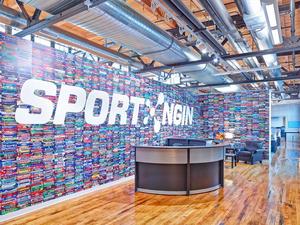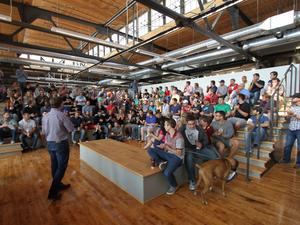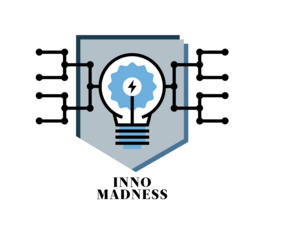Justin Kaufenberg and Carson Kipfer founded what would become SportsEngine Inc. in a University of Wisconsin-Eau Claire dorm room to make life easier for Kaufenberg’s dad, a board member and coach for the Shakopee Youth Hockey Association.
Kaufenberg drafted the program, called Puck Systems, to give his dad tools to spend more time on the ice, instead of buried behind mountains of paper and spreadsheets required to process player registration and coaching certifications.
Since its official founding in 2008, Minneapolis-based SportsEngine, whose applications help youth sports leagues to manage their websites and other online operations, has grown to over 500 employees serving 120,000 organizations across at least 100 sports.
However, SportsEngine, which sold to NBC Sports Group in 2016, was just the start of a burgeoning trend that turned Minnesota into a hub of startups that are changing how sports leagues are run, how players develop their skills, and how they're kept safe.
Techies turned coaches
Younger, more tech-savvy coaches and managers are using the skills they honed outside of youth sports leagues to make the experience more enjoyable not only for the kids playing, but for the adults running the programs. One example of this concept at work is TeamGenius.
Founded in 2016 by Chris Knutson and Todd Larson, the Minneapolis-based company provides evaluation software used at tryouts and clinics.
Last August, TeamGenius raised $1.1 million in a seed round of fundraising with participation from St. Cloud-based Great North Ventures and Minneapolis-based Groove Capital.
The company was born after Larson volunteered at his children’s soccer club and was tasked with handling player evaluations. After struggling with deciphering handwriting, manually importing the data into spreadsheets, and then wading into the politically charged waters of picking teams, Larson built a mobile app to streamline the process.
Knutson, who has served as CEO since 2018, said the growing ranks of millennial parents turned volunteer coaches are seeking digital solutions to every aspect of their lives.
“Most of my life, I've had a cellphone in my pocket. There's this natural turnover happening, where coaches and people running these organizations will have spent a greater and greater proportion of their lives with technology,” Knutson said. “Their default is like, ‘Oh, there's surely an app for that.’ The first thing that hits my mind is: There's probably a software tool that does what I need help with, and it makes sense for me to buy it.”
Knutson credits the concentration of forward-thinking professional talent in the Twin Cities as the reason youth sports leagues are run with more precision here than in other markets.
“If you're starting a sports tech company here, you have one of the best markets of customers, right from day one,” Knutson said. “You have the opportunity to meet face-to-face with people who are really open, progressive and organized.”
When he was scaling SportsEngine, Kaufenberg leaned into the state’s strong youth sports culture, specifically surrounding hockey.
“Minnesota's hockey community is highly respected nationwide. And so the leaders in the Minnesota hockey community are a lot of the leaders in the American hockey community and well-respected all over the world,” Kaufenberg said.

Once SportsEngine was the go-to platform used by hockey leagues in the state, strong community threads helped to pollinate the site’s offering across sports.
“What we found early on is the president of the local softball association is often the same person who’s the treasurer of the local volleyball organization, and that same person is the secretary of the local football organization,” Kaufenberg recalled.
Safety first
The most important aspect of youth sports isn’t who wins or loses, but how players are kept safe in the field of play and beyond, and now there are Minnesota-invented apps for that.
Edina-based Prevent Biometrics came onto the scene in 2015 after securing patents from the Cleveland Clinic to commercialize a concussion-detecting mouthguard. The latest iteration of its mouthguard monitors several measures of impact, including linear acceleration, rotational acceleration, location and direction, load, and impact count. Once an impact is detected, a trainer on the sidelines is alerted through a mobile app or online portal.
CEO Mike Shogren said Prevent’s device is better than any other concussion-detecting product, including helmets and skin patches, because it’s anchored to the skull. The mouthguard also allows coaches and trainers to set an impact threshold to monitor impacts they didn’t see.
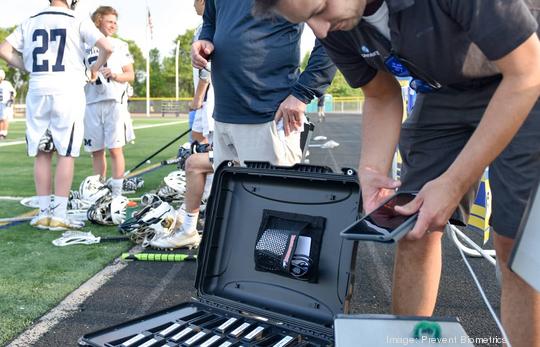
In 2018, Prevent partnered with 10 high school football teams to fine-tune the device’s performance and filter out false positives. Now it’s leveraged that early trial and error into a global deployment.
The company has shipped over 6,500 mouthguards across 12 countries. Through a partnership with World Rugby, Prevent has distributed hundreds of mouthguards to youth players in New Zealand to develop a database of rugby head impacts.
It also executed a $3.5 million grant from the Department of Defense to study head impacts in daily military activities.
Player’s Health is taking a different approach to safety.
The Minneapolis-based company got its start with an app to build profiles of athletes that allowed coaches and parents to track health issues such as injuries and allergies.
Since its founding in 2015, the company has progressed from a health-management organization into a risk-management company. In the past two-and-a-half years, the company has further evolved to offer commercial insurance at the organization level.
Founder and CEO Tyrre Burks said the company entered the insurance market after seeing how the number of insurance providers shrank from over a dozen to just a handful.
“One of the biggest things that’s been happening in sports today is that insurance capacity is evaporating,” Burks said. “They’re not there.”
Burks said sports organizations are on the verge of becoming uninsurable as high-profile abuse cases make national headlines and fetch tens of millions of dollars in settlements. As premiums skyrocket by 20% to 30%, that cost is passed onto families and players.
“Without a company like Player’s Health, there won’t be youth sports, because there won’t be insurance companies that are willing to write them unless they actually start to manage the health and safety of those athletes,” Burks said.
Player’s Health takes a hands-on approach to incident reporting. Rather than waiting for an incident to become a claim, the company manages and supports the organization in real time.
“The likelihood of a Larry Nassar situation happening in one of our organizations is almost impossible, because every incident is coming directly to us,” Burks said. “And then we investigate to ensure that it doesn't become a huge class action.”
The next frontier
Participation in youth sports has stayed relatively flat since 2012, according to data from the Aspen Project; however, esports are rapidly gaining in popularity. What was once seen as a casual hobby has turned into a legitimate profession with millions of dollars in sponsorship and prize money up for grabs.
Last year, Gwoop Inc. made headlines after it raised $1.8 million to expand its web platform, which includes a series of exercises focused on improving gamers' reaction times, visual memory and speed.
The Edina-based startup has partnered with esports leagues and high school teams as more colleges offer scholarships to gamers.
Another company wading into the esports category is LeagueOS.
The Minneapolis-based company began as a management tool for drone races. Eventually gamers caught onto the company’s simple operating system that covered everything from signups to generating content on livestreams.
To capitalize on this pivot, the company joined the inaugural Techstars Accelerator by the Minnesota Twins that concluded last month. CEO and co-founder Marty Wetherall said the opportunity came at the perfect time to reorientate the company to appeal to a broader market.
Wetherall’s background is more firmly rooted in traditional sports, while his co-founder and chief technical officer, Joel Stewart, has a background in game development.
Although he’s new to the sector, Wetherall said there’s a much broader group of people who can benefit from participating in so-called tech sports, which include video games, drone racing and robotics.
“It tends to be seen as screen time, and screen time is bad, but it’s the relationships that kids are building and nurturing with each other, and the character attributes that are built in competition and in dedicating yourself to something and getting really good at it,” Wetherall said.
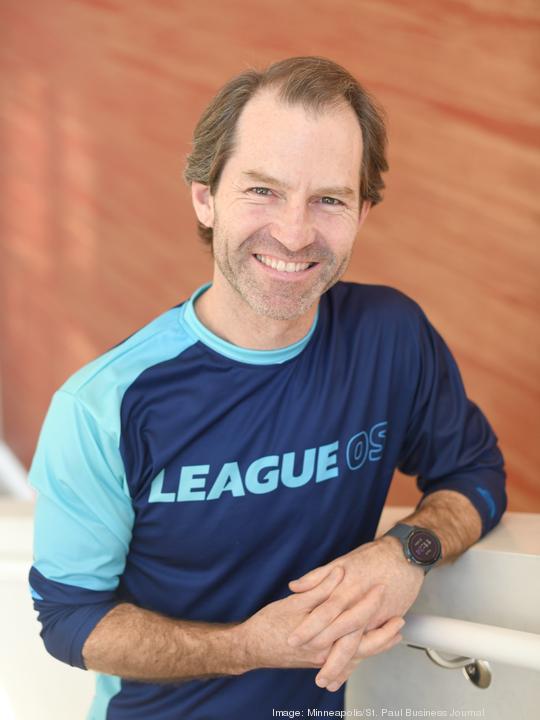
A previous version of this article misstated the name of Player's Health CEO Tyrre Burks.

